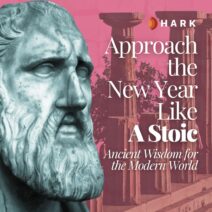What Is Prohairesis? Understanding the Stoic Meaning and Practice

Prohairesis is the Stoic term for your rational faculty of choice, the part of you that judges, decides, and acts. It is your moral will, the only thing truly under your control.
In Stoicism, prohairesis is not a vague idea of free will or general autonomy. It is precise: it refers to how you use your reason to respond to life. Whether facing praise or blame, fortune or loss, you always have one power: how you choose to think and act.
For the Stoics, this is what makes us truly human. And in a world full of noise, distraction, and pressure, learning to master your prohairesis is the path to inner strength and freedom.
Breaking Down the Word
Greek: προαίρεσις
Root words: pro- (before) + hairein (to choose)
Literally, it means “a choosing before” or “preference.” But in Stoic philosophy, it came to mean the deliberate faculty of moral choice, our reasoned capacity to assent to some impressions and reject others.
It’s not just about making decisions. It’s about making the right decisions based on virtue, not passion. For Epictetus, your prohairesis is your true self. It is your reason in action.
The Key Dimensions of Prohairesis
Inner Governance
Prohairesis is your inner ruling principle. It’s what evaluates every thought and event and decides what judgment to make and whether to assent, reject, or withhold on an impression.
Moral Responsibility
Because it governs how we respond, prohairesis is where moral praise or blame lies. You’re not responsible for what happens, but for how you judge and respond.
Rational Will
Your prohairesis must be guided by reason. It’s not about reacting emotionally, but about choosing what aligns with wisdom and virtue.
Identity and Integrity
You are not your status, your body, or your circumstances. You are your prohairesis, your capacity to live by reason.
Core Stoic Principles Behind Prohairesis
Virtue (ἀρετή)
Virtue is the perfection of prohairesis. A person is good or bad based on how well they use their rational will, not on what they own or suffer.
Reason (λόγος)
To live as a rational being means letting prohairesis lead. That’s what sets us apart from animals and keeps us aligned with our true nature.
Nature (φύσις)
Nature gives us a role to play. We cannot control the script, but prohairesis determines how well we act our part.
Wisdom (σοφία)
Wisdom is knowing what is up to us and what is not. That knowledge lives and acts through prohairesis.
Hēgemonikon vs. Prohairesis
The hēgemonikon (ἡγεμονικόν) is the ruling faculty of the soul, the part of us that thinks, perceives, remembers, and initiates action. It’s like the command center of the mind.
Prohairesis is a moral function within that faculty, our capacity for deliberate, ethical choice. You can think of the hēgemonikon as the whole mind, and prohairesis as the part that chooses how to respond to life with reason and virtue.
Understanding this distinction matters: while all rational beings have a hēgemonikon, only those who train their prohairesis live with true moral freedom.
Modern Misunderstandings
Many confuse prohairesis with free will or autonomy in a modern sense. But Stoic prohairesis is stricter and more empowering.
Not willpower.
Willpower can be impulsive or emotional. Prohairesis is always reasoned.
Not just freedom to act.
You may be physically blocked from acting, but your prohairesis remains free to judge well.
Not about controlling outcomes.
It is about controlling your judgments, desires, and choices, no matter the outcome.
Why Prohairesis Is Central to Stoicism
Epictetus starts his Discourses with this powerful distinction:
“Some things are up to us, and some are not.”
Epictetus, Discourses, Book 1, Chapter 1
The thing that is up to us? Our prohairesis. Everything else, health, status, weather, and reputation, is not.
To train your prohairesis is to train for freedom. You can face pain, loss, or insult without losing yourself. Why? Because you still choose how to interpret and act.
Marcus Aurelius echoes this:
“Your ability to control your thoughts—treat it with respect. It’s all that protects your mind from false perceptions.”
Marcus Aurelius, Meditations, Book 3.9
This is the role of prohairesis: not to control the world, but to control how you interpret the world. That is your true strength.
How to Practice Prohairesis
1. Pause Before You Judge
Train yourself to say, “Is this in my control?” before reacting. That moment of pause is where prohairesis lives.
2. Journal Your Impressions
At the end of each day, ask: “What judgments did I make today? Were they based on reason or emotion?”
3. Situational Practice
The next time someone insults you, use it as training: Can I choose my response instead of reacting?
4. Value Test
When tempted by praise or discouraged by loss, ask: “Is this truly good or bad, or just an indifferent?”
FAQ
What does prohairesis mean in Stoicism?
It means the rational faculty of moral choice. It’s your capacity to judge, decide, and act in accordance with virtue.
Is prohairesis the same as free will?
Not quite. It’s more focused. Prohairesis is about moral and rational choice, not just the freedom to act however you want.
Can anyone develop their prohairesis?
Yes. Stoicism is a practical philosophy. Anyone willing to reflect and practice can strengthen their prohairesis.
Conclusion
You don’t control your past, your body, or your reputation, but you do control how you respond. That response lives in your prohairesis.
Train it. Guard it. Let it guide you. Because when your prohairesis is aligned with virtue and reason, you become untouchable by fortune and free in the deepest sense.
Want to explore more Stoic strategies?
Book a free consultation with one of our Stoic Coaches or learn about more Stoic philosophy terms. You can also listen to the Via Stoica podcast on Spotify or Apple Podcasts or watch it on YouTube.
Author Bio
Benny Voncken is the co-founder of Via Stoica, where he helps people apply Stoic philosophy to modern life. He is a Stoic coach, writer, and podcast host of The Via Stoica Podcast. With almost a decade of teaching experience and daily Stoic practice, Benny creates resources, workshops, and reflections that make ancient wisdom practical today.
Related Posts
-
 Greek Stoic Philosophy Terms
Greek Stoic Philosophy TermsWhat Is Ekklisis? The Stoic Art of Avoiding What Harms Your Character
What Is Ekklisis? Ekklisis in Stoicism is the rational refusal to engage with what would damage one’s moral choice. The Stoic meaning of ekklisis is important because it teaches us what to turn away from, not out of fear, but out of commitment to living well. In daily life, ekklisis helps us step back from […]
Read more -
 Via Stoica Podcast
Via Stoica PodcastA Hark Audio Curated Stoic Playlist for 2026
At the start of a new year, there is often an unspoken promise that things will somehow be different. Calmer. More ordered. More predictable. Yet life rarely follows that script. Delays disrupt flights, plans break down, people drift away, and life brings events we cannot control. What we can work on, and what Stoicism has […]
Read more -
 Book Reviews
Book ReviewsThe Stoic Leader by John Sellars and Justin Stead
The Stoic Leader introduces Stoicism as a practical philosophy and explores how its principles shape leadership, judgment, and character in both work and life. Summary Written by John Sellars and Justin Stead, The Stoic Leader offers what is effectively two books in one. Sellars provides an introduction to Stoicism and its philosophical foundations, while Stead […]
Read more


Comments 0